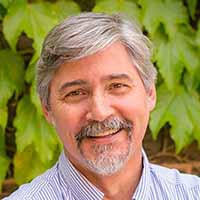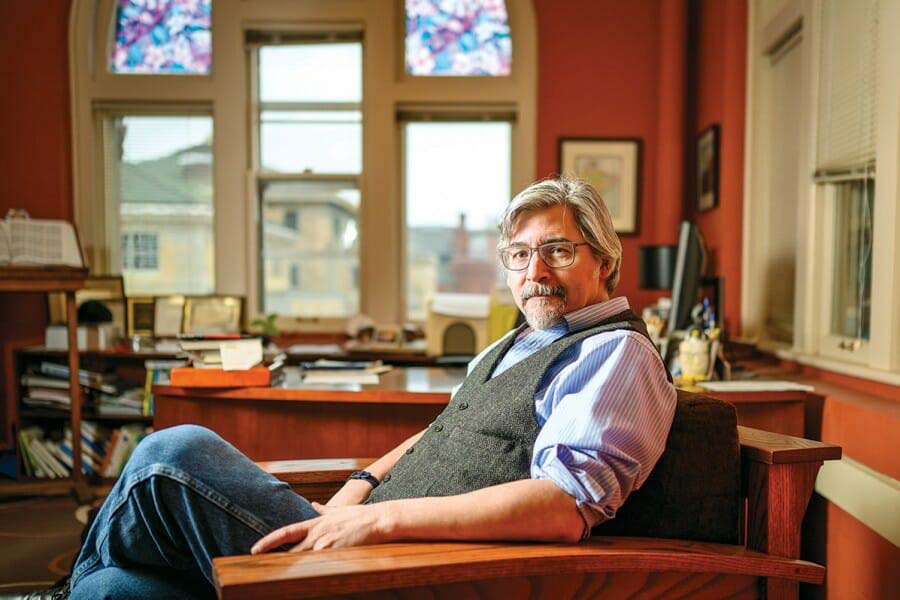Paul Robbins
Position title: Dean, Nelson Institute for Environmental Studies; Professor, Environmental Studies and Geography
Website: Paul Robbins' website
Email: dean@nelson.wisc.edu

Paul Robbins is the dean of the Nelson Institute for Environmental Studies at the University of Wisconsin–Madison, where he guides the institute in serving as a world leader in addressing rapid global environmental change. Robbins is also strengthening the Nelson Institute’s commitment to the Wisconsin Idea through the expansion of innovative service-learning and internship programs, partnerships across campus and with outside agencies and organizations, and with the sovereign native nations in the state now known as Wisconsin.
Robbins has years of experience as a researcher and educator, specializing in human interactions with nature and the politics of natural resource management. He has taught topics ranging from environmental studies and natural resource policy to social theory. An alumnus of the University of Wisconsin–Madison, Robbins previously led the School of Geography and Development at the University of Arizona, which he helped establish and served for two years as director. He was raised in Denver.
Areas of Expertise
Environmental politics, conservation, and environmental studies

Research Interests
Robbins’ research addresses questions spanning conservation conflicts, urban ecology, and environment and health interactions. He has done extensive fieldwork in rural India, where he has focused his work on the politics surrounding forestry and wildlife conservation in Rajasthan, India, as well as recent research examining the wealth of biodiversity (frogs, birds, and mammals) in commercial coffee and rubber plantations throughout south India.
Robbins has also led national studies of consumer chemical risk behaviors in America, including research on the abiding passion of Americans for their lawns and mosquito management policies in the Southwest. In addition, he has studied the complexities of elk management policy on the settled fringes of Yellowstone Park.
Teaching Activities
Robbins leads two courses for the Nelson Institute. The first is a class for undergraduates from across campus thinking about jobs after college. “Careers in the Environment” unites current undergraduate students in environmental majors with alumni who are succeeding in the areas of conservation, corporate sustainability, environmental policy, not-for-profit leadership, wildlife management, fisheries, and related fields. It unites a strategy for directing undergrads to the right courses and skill training with an appreciation of the diversity of opportunities available in environmental fields.
The second course is focused on recently arriving graduate students and provides an orientation to graduate school, its opportunities, and its hidden pitfalls. Focused heavily on Nelson students, the course works hard to reflect on the complexities of interdisciplinary study and work.
Author
With writing focused on diverse interdisciplinary audiences and the broader public, he is author of the foundational textbook Political Ecology: A Critical Introduction (Third Edition) and numerous research articles in publications that address conservation science, social science, and the humanities.
His award-winning book — Lawn People: How Grasses, Weeds, and Chemicals Make Us Who We Are — is widely recognized as one of the most accessible books on the environmental politics of daily life.
Selected Recent Publications
Robbins, P.; Hintz, J.; Moore, S. 2022. Third Edition, Environment & Society: A Critical Introduction. Oxford: Wiley-Blackwell. (First edition, 2010; Second edition, 2014; Korean Edition, 2015; Turkish and Arabic edition under translation).
Robbins, P. 2020. Political Ecology, Third Edition. Oxford: Wiley/Blackwell. (First edition, 2004; second edition 2012; Korean Edition, 2008; Turkish and Spanish editions under translation).
Zografos, C.; Robbins, P. 2020. “Green Sacrifice Zones, or Why a Green New Deal Cannot Ignore the Cost Shifts of Just Transitions” One Earth.
Robbins, P.; Tripuraneni, V.; Karanth, K.K.; Chhatre, A. 2020. “Coffee, trees, and labor: Political ecology of biodiversity in commodity agroforests” Annals of the Association of American Geographers.
Robbins, P.; Moore, S. 2019. “Return of the Repressed: Native Presence and American Memory in John Muir’s Boyhood and Youth” Annals of the Association of American Geographers. 109 (6): 1748-1757.
Robbins, P. 2019. “Scientific Opportunities in the Great Entanglement” Geographical Review. 109 (2):252-257.
Robbins, P. 2019. “Is less more… or is more less? Scaling the political ecologies of the future” Political Geography.
Davis, D; Robbins, P. 2018. “Ecologies of the Colonial Present: Pathological Forestry from the Taux de Boisement to Civilized Plantations” Environment and Planning E. 1(4): 447-469.
Robbins, P.; Smith, S. 2016. “Baby Bust: Towards Political Demography” Progress in Human Geography. 41(2): 199-219.
Recent Achievements
2022. National Science Foundation, (#2221468). “Challenging Problems and Sustainable Solutions – Training a community of Interdisciplinary Sustainability Scholars” Co-investigator ($1,500,000).
2020. National Science Foundation, (#1643946) “Together for the Planet 2.0: Community Environmental Scholars Program”, Co-Investigator. ($995,710)
2019-2020. Phi Beta Kappa Visiting Scholar.
2015. Wisconsin Department of Natural Resources/La Crosse Tribune Hunter Ethics Award for the free massive open online course (MOOC): “The Land Ethic Reclaimed”
2014. Robert McC. Netting Award from the Cultural and Political Ecology Specialty Group of the Association of American Geographers in recognition of distinguished research and professional activities
2009. James M. Blaut Innovative Publication Award for the book, “Lawn People: How Grasses, Weeds and Chemicals Make Us Who We Are”
Recent Media
2022. Interview. “Why Lawns May Have Their Day,” BBC. April 28.
2022. Moderator. “’Let’s Talk Climate Change’ with Bill Nye the Science Guy,” University of Wisconsin–Madison. April 26.
2022. Interview. “Everybody Loves Cranes,” WORT Radio. April 5.
2021. Multimedia project. “GRASS,” The Seldoms. October 14-16.
2021. Article. “John Muir’s Tormented Landscape,” The Breakthrough Institute. Co-authored with Sarah Moore. August 16.
2021. Op-Ed. “To Restore Biodiversity, Embrace Biotech’s ‘Intended Consequences’,” Scientific American. Co-authored with Ryan Phelan, June 15.
2021. Interview. “A Lush Lawn Without Pesticides,” Consumer Reports. April 8.
2021. Interview. “Becoming Invasive,” for Introduced, a podcast from the Wisconsin Sea Grant Institute. March.
Education
- PhD, geography, Clark University, 1996
- MS, geography, Clark University, 1994
- BS, anthropology, UW-Madison, 1989